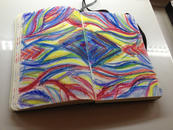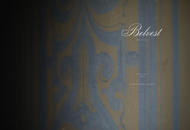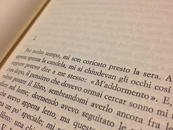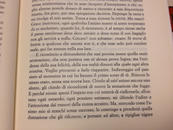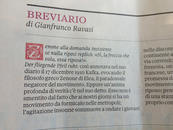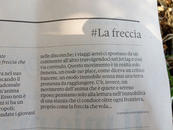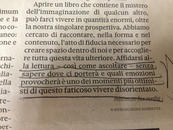In the portfolio section of our website, we present the look and ad campaign of the Belvest winter collection. The photo shoot took place at Villa Bolasco, just a few days before a major project to restore the building got underway. We also present the image of Jacketinthebox for summer 2013, entitled Light & Lightness.
A link will bury us
I happened to think about this during a rainy weekend spent sitting at the kitchen table and reading Proust's In Search of Lost Time. "In the near future will it still be possible to find people able to enjoy this genre of book? A book that requires a slow, careful reading that takes place over the course of days?" - I asked myself closing the first of three volumes at the end of the first of the seven books that make up the monumental work, “l'oeuvre cathédrale”.
It is a question that I will never ask my daughter and my father, and not so much due to their personal literary preferences, but for generational reasons, and for opposite reasons. My father wasn’t a part of the digital revolution and would find the question pointless; my daughter didn’t even perceive it, having started to read after the revolution had already occurred and would find the question absurd (after all that fact that I would deliberately chose to read more than three thousand of any author is proof, according to her, of the partial infirmity of my mind).
My generation was overcome by the digital revolution with impeccable timing. The revolution occurred just as we were making the transition from school to our professional careers. We studied books with a pencil in hand, writing letters with a pen, designing and learning techniques with our hands, getting them dirty; and then we had to re-learn a method and a system from scratch. We had to learn to read from a screen and to use only a few fingers, rather than dirty hands. But it didn’t end there. We also had to re-learn a way to communicate with others, a way of “being in the world” and, of course, had to readjust the whole dynamic of our organizational and conceptual work. But the educational germs we were inoculated with during the first two decades of life evidently didn’t affect this epoch change of point of view. Otherwise we would still be asking ourselves questions such as the aforementioned.
Because this was in fact the digital revolution: a change of worldview, an epoch change of worldview. As a cultural history buff, I compare the digital revolution to the transition from the manuscript to the printed book. I do not see other possible comparisons. We may clearly see and understand the digital revolution because we experienced first hand. The experience is blurred because we are looking at it from up close. But I think I don’t think I am exaggerating when hazarding such a comparison.
I will try to recount the past revolution: in the days of Gutenberg, throughout Europe there were about thirty thousand hand-written books; within fifty years more than ten million printed books were released on the market. All this led to an acceleration of cultural, and therefore social, dynamics, opening society to the revolutions that took place in no time at all, given the reaction time period, the Middle Ages to full modernity. It happened like this and the new science spread quickly, leading to political revolutions, the Protestant Reformation, as well as new forms of well-being...
To consider the past the relevant and continuous line of cause and effect seems intelligible. It is the outcome of historicizing, which is always a stretch of reality (many solutions only become clear after mounting and remounting the picture). But if we looked at our world, or our technological revolution, with the eyes of historians, could we say that the consequences of this revolution are comparable to those of the fifteenth century? I think so, actually I think about how these changes have radically changed the lives of billions of people, I think the impact in the global context is far greater. In the fifteenth century the revolution affected only certain parts of Europe and slowly over the centuries. With the digital revolution you are talking about changing the entire universe in just a few decades. And what are the outcomes of this new revolution? New widespread science, new awareness, political revolutions, new forms of wellbeing, or at least believed to be? Sure. But of what nature? This is impossible to answer for the same reason it is impossible to see the contours of your hand when it is placed at the tip of your nose, even if you are Pinocchio.
Ermanno Bencivenga reminds us that in the face of such radical revolutions a part of humanity tends to embrace novelty with enthusiasm, another part pulls away, afraid to enunciate dark and apocalyptic prophecies. I do not deny that for a long time I suffered this revolution, adapting without enthusiasm, without enunciating dark prophecies. It is evident that in spite of this “adaptation” my approach and ways of working are very different than those of my younger colleagues, the so-called digital natives. This confirms that the educational germs didn’t dry up upon contact with the new dynamics of reading, and therefore of thought, induced by the massive use of new technologies.
Thanks to Bencivenga I came to learn of Nicholas Carr and his book “The Shallows: What the Internet is Doing to Our Brains” in which he argues that "the ability to focus for a longtime and think in an in-depth and analytical way is succumbing to the aggression carried out by the web and in particular its basic element, the link. Links are encouraging us to enter and exit of a series of texts rather than devote our attention to just one of them."
Links are designed to capture our attention and are effective because of their ability to “distract.” We all understand this due to personal experience. For this reason Carr sees a dangerous drift in the information revolution rather than a happy landing, creating mass confusion and superficiality.
But Howard Rheingold (and what a Wagnerian name) responds to Carr in his “Net Smart: How to Thrive Online.” In truth Rheingold also perceived the same risk feared by Carr, but it goes beyond, pointing to the way out to fully enjoy the benefits of the web. He says that to get around the obstacle of distraction one needs to know how to move consciously, using links to their own benefit. This exercise requires the conscious control of one’s attention and the use of the weapon of suspicion about what is on the net, checking and triangulating sources. In short, he illustrates the practical method of exploiting the web, which he believes is the only way to obtain real benefits.
Carr against Rheingold, therefore. Who retracts afraid to enunciate dark and apocalyptic prophecies, and who enthusiastically embraces the new. The prerequisite, however, remains identical: the omnipresence of links leads to superficial reading and obsessive clicking.
But Bencivenga, it turns out, discovers a flaw in the thinking of the Rheingold, embracer of the new: "Do not you realize that the conscious and responsible individual he speaks of is the product of a social and educational environment now on its way to extinction. He constantly cites himself as a model of virtuous use of IT tools without recognizing that he is the product of another social environment and education. He came to those instruments as an outsider and for this reason can use them without being engulfed by them. This does not apply to young people born in the era of the web and know no other reality than this: immediacy and digression."
Reading (and therefore learning, and thinking, and experience): immediacy and digression. The opposite of the act (and art) of serious reading, which includes two movements of the mind: the interpretation (hermeneutics) and evaluation (criticism, aesthetic judgment) - indeed inseparable. In fact interpreting means judging (the same antidote recommended by Rheingold).
Immediacy and digression Readers of background noise, parasites, atrophy of memory... What will come of it, I think, from people like that? Bencivenga, with clarity, without emphasis and drama, wonders if these people will still have a Cartesian consciousness, objectives, a clear distinction between public and private sectors.
Bencivenga does not make a drama, but these are the dilemmas that can’t fail to stir the conscience.
I return finally to the beauty that contrasts the anxiety, I return to reading Proust. A challenging experience, requiring slowness, patience, and no distractions; pages that speak directly to the soul, capable of producing a slow emotional palingenesis. Able to plumb the depths of the most minute anecdote as the decisive questions on the sense of time, sense of the world. The work of someone emotionally microscopic who tries to penetrate our emotional contradictions and those around us, the weakness and meanness of each and describes how the soul is melted in front of a memory. A musical score, which is played for a very long time and without notes. A heroic bet against forgetting.
12/07/2013 Filippo Maglione



